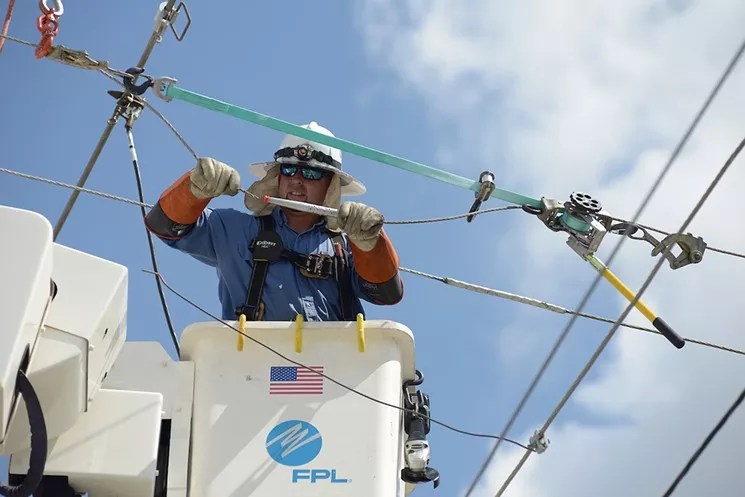
Florida Power & Light

Audio By Carbonatix
In the long, hot, powerless days after Hurricane Irma, Miamians grew all sorts of irate at Florida Power & Light, South Florida’s largest electricity company. After sweltering for more than a week without power, a group of sweaty Miami-area residents sued FPL last year over the widespread outages after the storm.
Despite the fact that FPL says it spent more than $3 billion hardening its power grid after Hurricane Wilma hit in 2005, 4.4 million of the company’s 4.9 million customers (about 90 percent) lost power during last year’s hurricane despite the fact that Miami ended up avoiding sustained hurricane-force winds. In their class-action lawsuit against FPL, filed in county court September 26, the residents alleged the company misspent those storm-hardening funds.
This past Tuesday, Circuit Judge David C. Miller ruled the suit can continue despite FPL’s moves to dismiss the case. Miller denied the power company’s motion and ordered FPL and its parent company, NextEra Energy, to answer the complaint within 20 days.
The residents say the judge’s ruling opens the door to get some measure of compensation for everyone in Miami who paid for a hardened system but ended up roasting for days after Irma.
“At stake for FPL are the claims of all customers who paid for storm-recovery charges and nevertheless lost power for a prolonged period in the sweltering summer heat after Hurricane Irma’s outer bands unleashed tropical storm force winds in the South Florida area,” a law firm representing the plaintiffs said in a statement. “Because of the extended electrical outage, FPL customers were exposed to dangerous conditions and suffered consequential damages.”
FPL – a massive state-regulated monopoly that made a $1.8 billion net profit in 2017 – routinely comes under fire after major storms and power outages. After mass blackouts post-Wilma, the company took huge flak and promised to harden its grid to prepare for the next hurricane.
A major storm somehow didn’t hit Miami again until Irma, and in that time, FPL raised rates on consumers in order to pay for the $3 billion in upgrades meant to protect the grid from the next ‘cane. FPL maintains the upgrades were only meant to help restore power faster after a storm rather than prevent power outages. Though more customers lost power during Irma than Wilma, FPL says its statistics show the company restored power quicker than it did after Wilma.
But critics have questioned why that $3 billion wasn’t spent on other storm-hardening fixes, such as setting up solar-power microgrids that could have helped communities power themselves during outages. The lawyers for the plaintiffs also argue that FPL should have buried more power lines; the company has committed to placing more lines underground post-Irma after public outcry. (Coral Gables has also sued FPL after the city claimed the company botched its storm-hardening procedures.)
FPL filed a motion to dismiss the class-action suit this past February and argued the company was upfront about what the “solar hardening” initiatives would fix. The company says consumers were warned the upgrades wouldn’t prevent power outages. (FPL also argued that the Florida Public Service Commission, the state regulatory board accused of being cozy with energy companies, is the only body that can impose regulations on what the company can and cannot spend its money on.) FPL’s lawyers argued that the case’s ten plaintiffs “failed to connect their hyperbolic references to FPL’s allegedly massive failures to any actual damages” they allegedly suffered.
A circuit judge, however, disagreed.